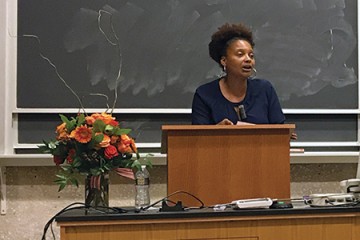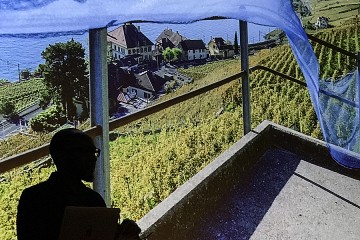Author Lorrie Moore opened her talk at Johns Hopkins University on Tuesday with a practical dilemma: Which microphone should she use?
To the delight of the crowd that had gathered in Mudd Hall Auditorium to attend the Chaffee Visiting Writer book talk on the university's Homewood campus, she weighed her options. One was a handheld mic the size of a 9-volt battery, but it was awkward to hold and would hinder her ability to turn a page. The other, a table-mounted conference microphone, provided slightly better volume but required a certain hunching motion that was complicated by an obtrusive bouquet of orange roses and eucalyptus that had been placed on the table.

Image caption: Lorrie Moore
Then the New York Times best-selling author—known for her humorous and beguiling writing style—offered a compromise, nestling the smaller mic into a rose blossom and speaking softly into it—"How's this?"—before the audio tech suggested she simply rest the mic on the podium, a solution that seemingly hadn't occurred to her.
It's part of the charm and magic of Lorrie Moore, a PEN/Malamud Award winner whose short stories have appeared in The Paris Review, The New Yorker, and The Best American Short Stories of the Century. Her flight of fancy with the rosebud mic stand speaks to her practice of celebrating the whimsy in everyday dilemmas—finding their truths and exposing their illusions while capturing them in a way that disarms and enchants her audience.
Moore opened her reading with an excerpt from an essay published in her latest book, See What Can Be Done. In it, she recounts the details of her wedding day, when she and her husband were joined at the courthouse by a 60 Minutes camera crew that needed B-roll of a wedding for an exposé on welfare fraud.
Never mind that Moore and her betrothed were not on welfare. No one watching the segment would know that, the crew had told her.
"This particular parsing of reality troubled me," Moore read aloud from the essay. "If something was already half a lie, then it was really a whole lie so make it a whole one."
This ethos echoes Moore's view on writing, as well. "Fiction is something that people assume is nonfiction, and nonfiction is something that seems invented," she said.
Also see
If the presence of the 60 Minutes crew on her wedding day is one of those details that seem invented, then her second reading, "The Juniper Tree" from her short story collection Bark, is one of those works of fiction that is all too close to reality. It captures details of the human condition with a haunting authenticity—despite the story's surreal, fairy tale details.
When the story's unnamed narrator learns that a friend whose boyfriend she may have stolen has died from a brain tumor, she laments not visiting the woman in the hospital when she had the chance.
"'I feel terrible,' I cried, as if this were what mattered," Moore read.
Even as the narrator attends a supernatural farewell party in the dead woman's house, Moore's observations of human vanity and existential fear ring true. Fiction as nonfiction.
She attributed the power and authenticity of her work to the fact that as she's aged, her writing is increasingly informed by her own experiences—the people she's met, the places she's been. The magic, she said, is in the surprises she uncovers while writing.
"I have a pretty strong idea [of how a story will unfold]," she said. "But you have to have some surprises along the way in order for there to be surprises for the reader, otherwise the reader will feel the predetermined quality of the story in advance."
Posted in Arts+Culture, Voices+Opinion
Tagged writing seminars, fiction writing, fiction, nonfiction









